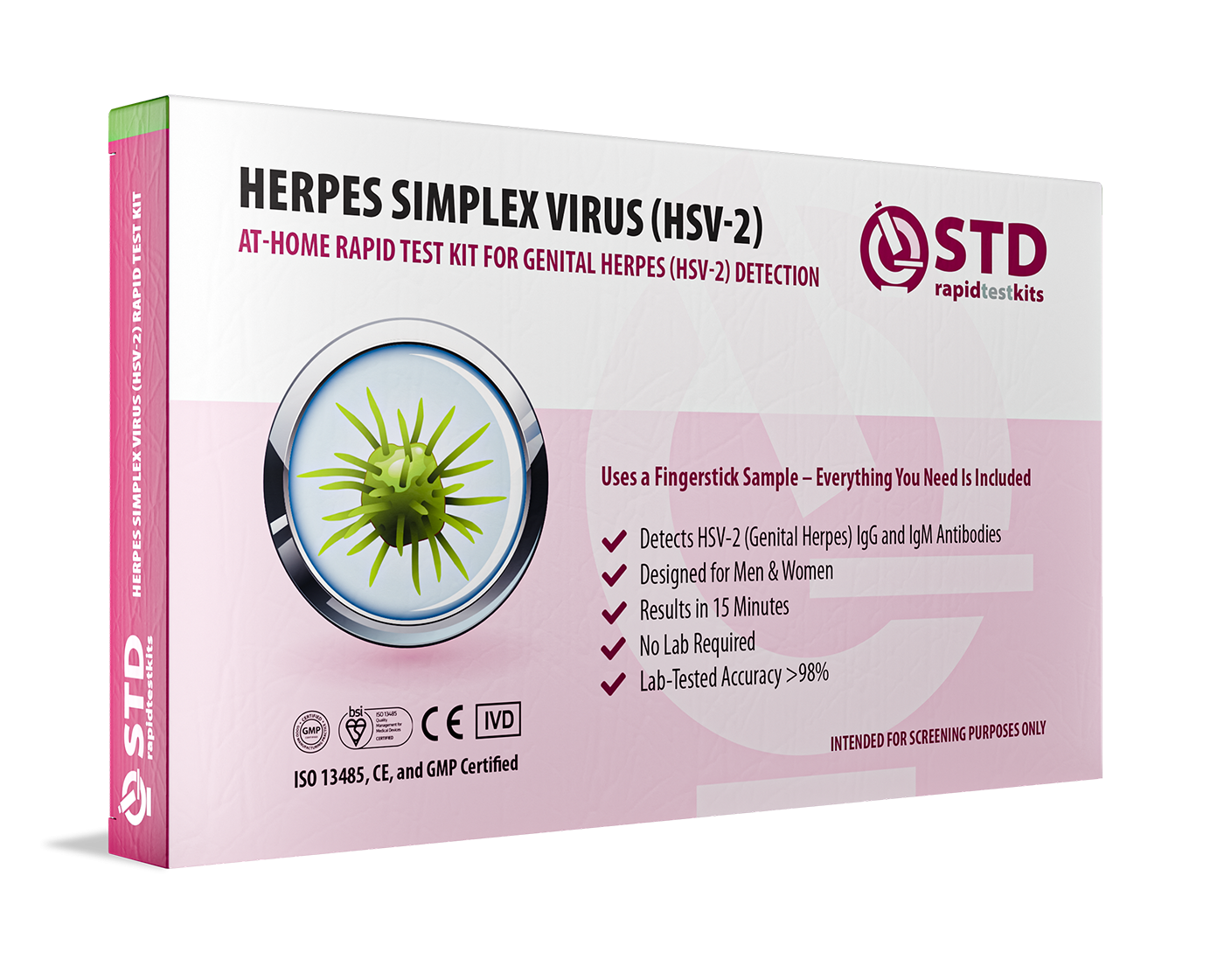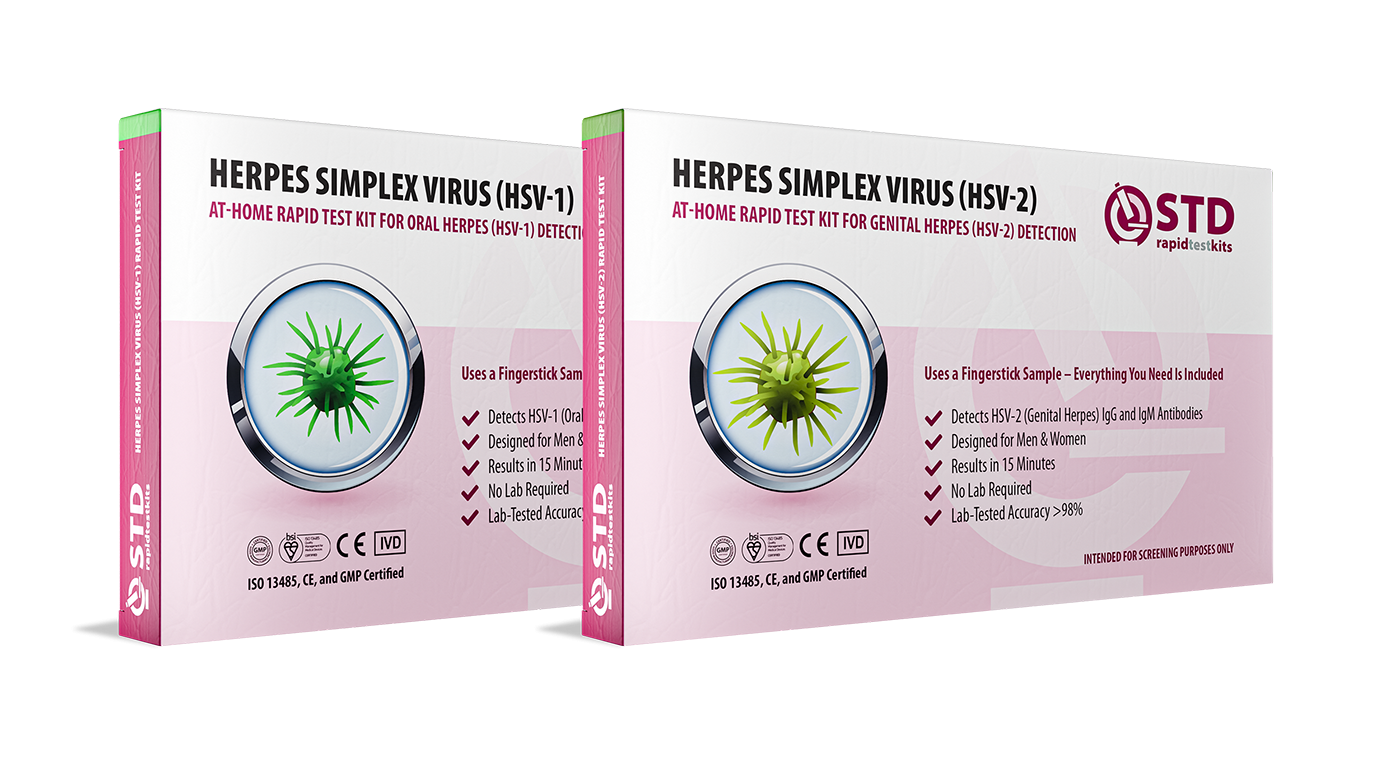I Only Kissed Them, So Why Do I Have Herpes Now?
Herpes: What It Is and Why It Early Diagnosis is Crucial in Pregnancy
Genital herpes has a reputation that's bigger than it really is. Most people think it's weird, dangerous, or a sign of something about a person's decisions. But the reality is, herpes is extremely common. The majority of people who have it aren't even aware of it. In the US, almost one in five adults aged 14-49 have genital herpes, according to the CDC. And when pregnancy is a factor, that number is more than a statistic. It's a very real fear for those who are trying to protect their unborn children.
There are two types of herpes simplex virus. HSV-1 is most frequently the cause of oral cold sores but can infect the genitals via oral-genital contact. HSV-2 typically is the culprit behind genital herpes and is the more probable cause of frequent, long-term outbreaks. No matter the type, the question when pregnant is always: will this virus hurt my baby?
The most significant risk is neonatal herpes, a potentially life-threatening but uncommon illness that happens when a newborn comes in contact with the virus during birth. The danger is greatest when someone gets herpes for the first time while pregnant, particularly during the third trimester. That's since the body has not had the opportunity to build up the defensive antibodies that restrict transmission to the baby.
If herpes is acquired in late pregnancy, the body is still developing an immunity, and therefore it is more difficult to prevent passing the virus on to the baby at birth.

Why Earlier Diagnosis Reduces Risk
If you already had an infection when you became pregnant, your situation is really different. Those who are already infected with herpes have antibodies that provide some immunity to the baby. In those cases, transmission is a lot less likely to happen, particularly if you have no active symptoms at delivery time. And that is where modern medicine helps.
Doctors these days monitor pregnancies with HSV a lot more aggressively than they did years ago. That is to say, you're not left to guess or hope for the best. You are being monitored, guided, and taken care of by professionals who do this every day. Your doctor will generally recommend beginning antiviral drugs such as acyclovir or valacyclovir later in pregnancy, around the 36th week.
These drugs suppress the possible outbreaks and also bring down the viral shedding level, hence lowering the transmission risk. In case there are prodromal symptoms or a sign of a lesion during the time of delivery, a C-section will typically be recommended to protect the baby
These are not worst-case situations. These are set protocols based on decades of research and patient outcomes. Medical professionals understand how to handle this clinically. Your job is not to panic. It's to stay informed, stay honest with your healthcare provider, and stay ready to make decisions that protect both your health and your child's.
Herpes Pregnancy Management: The Advantages of Being Prepared
Pregnancy already demands so much of you. It transforms your body, your emotions, your priorities. Add a herpes diagnosis to the equation, and all of a sudden it's like everything has been turned on its head. But here's the reality that too many people never have the chance to hear: finding out you have herpes isn't something to be feared, it's something to prepare for, and with the right information and medical care, that preparation can be the game-changer.
One of the largest benefits of early diagnosis is control. Knowing in advance about your HSV status, your physician can assist you in preventing risk of harm to you and your child. That's equivalent to keeping outbreaks at bay, preventing transmission during delivery, and having your back so you don't feel so lost in the midst of a healthcare system that sometimes reminds you too badly how human it's all supposed to be.
Initiating antiviral medication in the last few weeks of pregnancy can actually reduce your risk of an outbreak during delivery. This is important because the presence of active sores at the time of delivery is the greatest risk factor for neonatal herpes. Daily medication, beginning at about week 36, is one of the most effective ways of keeping you and your baby safe.
Other than the physical protection, forward planning also enables informed decision-making and emotional comfort. If your healthcare professionals know your status, they can watch out for signs that you might miss. They can help you decipher your options, whether it's preparing for a possible C-section, stress management to avoid triggers, or being heard instead of judged.
What Preparation Gives You
It's not so much about drugs. It's about clarity, confidence, and a feeling of stability when everything else may seem to be changing overnight. Here is what good management can deliver:
- Less risk of transmitting herpes to your baby with suppressive treatment
- Clear delivery plans if outbreak is present
- Less surprise and more planning with your prenatal care
- Advice from doctors who know how to guide you through this without judging you
A healthier mindset, one that is shame or loneliness-free Pregnancy does not need to become a horror story just because herpes is a part of it. If anything, a diagnosis allows for the opportunity to do something early, responsibly, and with a plan in place. You don't have to do it all alone. You just have to be willing to talk and be informed.
Check Your STD Status in Minutes
Test at Home with RemediumGenital Herpes Test Kit

 For Men & Women
For Men & Women Results in Minutes
Results in Minutes No Lab Needed
No Lab Needed Private & Discreet
Private & DiscreetOrder Now $45.99 $49.00
Risks and Challenges: What Herpes-Positive Pregnant Women Should Watch Out For
Despite proper care, a herpes diagnosis while pregnant does have some not-so-nice realities. There are dangers. There are times that call for action. And pretending otherwise doesn't do anyone any good. Yet there is a line between being informed and being scared. You don't have to panic to take this seriously. What you do need is a good understanding of what can go wrong, and how to deal with it before it does.
The greatest risk is timing. If you're infected with herpes for the first time while pregnant, particularly in the third trimester, your body hasn't had a chance to build up antibodies. Your immune system therefore can't provide as much protection for the baby, and you're more likely to transmit the virus during birth. It's the most vulnerable window, and one that necessitates prompt action and medical advice.
If transmitted at birth, then there's a small but genuine risk of neonatal herpes. This varies from infections at the skin level to far more serious problems with the brain, liver, or lungs. It's life-threatening if not treated, and although not common, it's the condition which makes doctors so very cautious. And, of course, there is the emotional load. Shame, fear, and secrecy are three of the most difficult to bear during pregnancy.
Others are so fearful of judgment that they won't tell their doctor they've been diagnosed. Some withdraw, believing they've failed before they've even started parenting. These emotional and mental weight classes are just as important as the medical aspect. Because when you're beat down by shame, you're less likely to speak up for yourself, and that's when danger increases.
What to Look For
Being ready also means being aware of what to look out for. Following are the biggest things to look out for:
- New infections during the third trimester: These are the most dangerous since your body has not yet developed protection.
- Outbreaks close to delivery: Active symptoms at the time of labor are the most probable reason for a switch to C-section.
- Emotional distress: Pregnancy is stressful enough. Throw HSV stigma into the equation, and mental health can decline.
- Disinformation: All online tips are not created equal. Misinformation is worse than herpes itself.
- Unspoken fears: Silence does not help anyone. Keeping your diagnosis from your provider creates unnecessary danger.
You don't need to be neurotic about these things. You just need to remain vigilant and speak up when something shifts. No symptom is too minor to mention to your doctor. No fear is too ridiculous. If something doesn't feel right, physically or emotionally, say something. That's what care is for.

Solutions and Recommendations: Safe Pregnancy with HSV
Here's where the fear starts to lose its grip. Because while the word "herpes" might carry decades of shame and stigma, the medical reality today is far more hopeful. If you're pregnant and you have HSV, there are clear, research-backed steps you can take to keep your baby safe and manage your health, without sacrificing your peace of mind. You are not a victim of this virus. You do have choices. And you do have time to get ready.
One of those key interventions in that plan is suppressive antiviral therapy. Physicians usually prescribe it around week 36 of pregnancy. Medications such as acyclovir or valacyclovir decrease the recurrence and severity of lesions and, most importantly, the viral load on the skin, which dramatically decreases the risk of transmission during delivery. This is not experimental. This is standard care. And it is effective.
One other key decision boils down to how you deliver. If your doctor detects any hint of an outbreak when you go into labor, or if you feel symptoms yourself, a cesarean section is usually the safest route. Although that may not have been included in your initial birth plan, it's an effective way to safeguard your baby and regain control over your delivery process. A planned C-section is not a failure. It is a decision that is made in strength.
Beyond medication and delivery, there are things you can do on a daily basis to get ahead of this. Stress reduction, sufficient sleep, and proper nutrition can all reduce the risk of outbreaks. That is, taking care of your body starts with taking care of your mind, too. And easier said than done, I know, when you're managing the physical and emotional toll of pregnancy, but even small efforts, daily walks, hydration, giving yourself permission to rest, can make more of a difference than you might realize.
What Works Best
If you want a quick summary of takeaways, here are the top things to do for herpes management during pregnancy:
- Begin antiviral therapy around 36 weeks under the supervision of your doctor.
- Plan a C-section only if there is an outbreak during labor
- Employ home STD testing early during pregnancy in case you are uncertain about your HSV status.
- Identify your breakout triggers and reduce them whenever feasible (tiredness, tension, dehydration)
- Keep your OB-GYN updated on what is happening
Trust science-based information rather than fear-based information or anonymous "advice" Most of all, don't let a diagnosis make you isolated. You aren't the first to travel this path, and you certainly won't be the last. There's an entire system of care designed to travel it alongside you. Doctors. Therapists. Support groups. Even strangers on the internet who've gone through it and emerged holding their babies, safe and sound. There's no shame in asking for help. And quite possibly, that's the bravest thing you can do.
Check Your STD Status in Minutes
Test at Home with RemediumGenital & Oral Herpes Test Kit

 For Men & Women
For Men & Women Results in Minutes
Results in Minutes No Lab Needed
No Lab Needed Private & Discreet
Private & DiscreetOrder Now $75.00 $98.00
For all 2 tests
What Doctors and Moms Have to Tell
Oftentimes the most comforting words don't come from a textbook. They come from someone who has traveled where you're traveling, or from a doctor who's spent years seeing people fight through it and emerge on the other side stronger than they ever thought possible. What is it that brings together the medical expertise and life experience to make fear give way to knowledge, and knowledge to action?.
Dr. Susan Kim is a maternal-fetal medicine OB-GYN specialist who's encountered many herpes pregnancies. According to her, "We see patients with HSV all the time. The most important thing is that with good care, it's very uncommon that the virus is going to impact the baby. What's most important is when they got the infection, and how we handle delivery.".
If an individual comes in with a documented history of herpes, we already have a good established set of options to protect the child. No alarm. Just a plan.
That confident calm is backed by science. In 2020, research in the Journal of Obstetrics and Gynaecology Canada determined that suppressive antiviral drug therapy during the third trimester, along with C-section delivery if there are active lesions, reduced the risk of neonatal herpes to nearly zero. Not low. Not uncommon. Nearly zero. Guesswork is no longer an option. Strategy is now.
But for many, the real healing begins when they read other people's stories who've walked this journey. On websites like What to Expect and Mumsnet, mothers share information that is so much more human than medical charts can ever hope to be.
One woman posted:
"I was so scared when I discovered that I had HSV-2 at 28 weeks. My mind went to the worst possible places. I imagined my baby in an incubator. I imagined doctors looking down on me. But none of those things occurred. My doctor was wonderful. She didn't bat an eye. She put me on valacyclovir immediately. I did not have any outbreaks prior to giving birth, and I delivered vaginally a perfectly healthy baby girl."
A woman described her experience with HSV-1.
"I've had it for years, and I informed my OB as soon as I was pregnant. She didn't make a big deal out of it. She monitored me closely during the pregnancy, and when I noticed a small sore at 39 weeks, we did a C-section immediately. It was simple. No issues. Really, the hardest part was working up the nerve to say it out loud the first time."
These accounts do not erase fear. But they offer something of even greater value, proof that your fear doesn't have to decide the outcome. The healthcare system is familiar with how to help you. Other women have passed through it and come out with nothing but love in their arms and hope in their hearts. You are not the exception. You're part of an unheard, growing majority that's learning how to talk about herpes during pregnancy without shame.

How to Use This Information: Practical Steps for HSV Pregnant Women
It's another thing altogether to learn the facts and the stories, to nod your head in agreement as your heartbeat drops a notch. But then what? What do you actually do with all you've learned? This is the part where you take that anxious energy and make it into a plan. It doesn't need to be great. It just needs to be yours.
Tell Your OB-GYN Right Away This cannot be emphasized enough. If you haven't already informed your doctor of your diagnosis, do so now. Don't wait for symptoms. Don't wait for fear to subside. The earlier your provider knows what you're dealing with, the earlier they can move to safeguard you and your baby. They won't judge you. They've heard it all before. What they require is information, not apologies.
That single discussion gets everything underway, from surveillance and education to mapping out a safe delivery plan that's specific to your case.
Inquire Regarding Suppressive Therapy During the Third Trimester
By week 36, most providers will also have you take a daily antiviral medication to help reduce the risk of an outbreak before delivery. One of the most effective ways to avoid transmission to your baby, and to allow yourself some peace of mind as you approach labor, it's also very safe for both you and your baby, and has been used for years by women in your position.
Listen to Your Body
You already know your body better than anyone. Now’s the time to pay even closer attention. If you notice tingling, itching, or any early signs of an outbreak, don’t wait. Call your doctor. Catching a flare-up early can completely change how your delivery is managed. The earlier it’s on their radar, the more time you both have to respond with care, not chaos.
Consider At-Home Testing Early in Pregnancy
If you’re unsure about your status or your partner’s, a discreet at-home STD test can help give you clarity before your first appointment or alongside your prenatal labs. These tests are especially helpful if you’ve had past partners you’re not sure about or if you’re in a new relationship and haven’t tested yet. Early knowledge gives you the most time to plan.
Protect Your Mental Health
This piece is one that tends to get relegated to the backburner. Getting a herpes diagnosis while pregnant might bring up feelings you hadn't expected, shame, loneliness, guilt, even fear of being seen differently. Feelings that are real, but shouldn't run your life. Is it a therapist, a support group, or an online forum that actually does feel safe? Prioritize your emotional well-being.
You're trying to do one of the hardest things a human can do: growing a child while also still being yourself. You don't have to do it by yourself.
Be Ready for Either Delivery Scenario
The truth is simple: most people with herpes give birth vaginally without complications. But sometimes, things shift. If an outbreak shows up close to labor, your doctor might recommend a C-section. Having both plans in your head early, understanding what to expect, knowing that neither means you’ve failed, can take the edge off that last-minute scramble. It’s not about fear. It’s about readiness.
Planning pregnancy with herpes is not about reducing risk to zero. It's about doing what you can, when you can, with what you have. The rest is up to the team that's standing beside you. And they are standing beside you, whether you've had years to learn your diagnosis or just found out yesterday.
Check Your STD Status in Minutes
Test at Home with Remedium10-in-1 STD Test Kit

 For Women
For Women Results in Minutes
Results in Minutes No Lab Needed
No Lab Needed Private & Discreet
Private & DiscreetOrder Now $189.00 $490.00
For all 10 tests
Breaking Down Myths: The Lies That Hurt the Most
It's not only the diagnosis that's making individuals feel scared. It's all that has been whispered about it. The myths. The horror stories. The old wives' tales that still circulate through some clinics, friend circles, and online communities like ghost stories designed to keep you quiet and ashamed. These misconceptions don't only make you feel worse, they can prevent you from getting the care you need. So let's crack them open, one by one, and shed some light on the truth.
Myth #1: If you have herpes, it's impossible to have a healthy baby.
This is the initial and most hurtful lie that most individuals believe. It gets planted like a seed the instant one hears the word herpes in the same sentence as pregnancy. But it's not true. Not even close. The vast majority of individuals with HSV go on to have healthy, full-term pregnancies. With proper care, most will never transmit the virus to their baby. This diagnosis is not a sentence. It's a detail. And it doesn't get in the way of safely bringing life into the world.
Myth #2: If you have herpes, you'll need to have a C-section.
A C-section is not a sure thing. It's a precaution that's only taken if necessary. If you're asymptomatic when you go into labor, most individuals with HSV can deliver vaginally without complication. Your physician will examine you around the time of labor, inquire about symptoms, and decide in the moment, not solely on your diagnosis. A C-section is a precautionary measure, not protocol. And if you undergo one, it doesn't mean you've done anything wrong.
Myth #3: Herpes will automatically harm the baby.
The fear is valid here, but the facts are more reassuring than most expect. Neonatal herpes is serious but uncommon, especially when the infection existed before pregnancy and is well-managed. The highest risk is with new infections in the third trimester, not long-term, well-managed infections. That's why doctors emphasize timing, monitoring, and medication. It's not a done deal. It's manageable.
Myth #4: You'll always know when you're having an outbreak.
Sorry, this one's a brain-twister. Many people have HSV and never experience symptoms. Some people shed the virus without knowing it, so they can still give it to someone even if they don't have sores. That's why testing and honesty are so important. Because just because you're okay doesn't mean nothing is going on behind the scenes. And just because someone never had a sore doesn't mean they don't have HSV.
Myth #5: You can't breastfeed if you have herpes.
Aside from an open sore on the nipple or breast, breastfeeding is completely safe. Herpes is not transmitted through breast milk, and transmission from breastfeeding is felt to be extremely unlikely. It's a reasonable thing to discuss with your healthcare provider around delivery time but in most situations is not necessary to avoid breastfeeding.

FAQs
1. Can I have a normal vaginal delivery if I have herpes?
Yes. As long as you have no signs of an active outbreak when you go into labor, no lesions, no burning, no prodromal symptoms, vaginal delivery is generally considered safe. Your physician will probably examine you during your last few weeks and again when you go into labor. If you've been taking suppressive therapy and haven't had symptoms, there's a good chance your delivery will be like anyone else's. And if something does happen, you'll already have a backup plan in motion.
2. What if I have an outbreak while in labor?
This is when a C-section is safer. If you develop lesions or symptoms while in labor, the baby can be exposed to the virus in the birth canal. To avoid that, your doctor will typically suggest a cesarean delivery. It's not fear or punishment, it's protection. And although it might not have been part of your initial birth plan, most individuals are grateful that this option is available for circumstances such as this.
3. Can I use herpes medication during pregnancy?
Yes, and in most instances, you definitely should. Antiviral drugs such as acyclovir or valacycloir are taken regularly during pregnancy, particularly in the third trimester. They discourage outbreaks and decrease the risk of viral shedding prior to delivery. These drugs have been used a great deal and are well tolerated by both parent and child. Your physician will instruct you when to begin treatment.
4. How do I know if I've passed herpes on to my baby?
Neonatal herpes usually occurs in the initial weeks of life but is uncommon when proper precautions are observed. It may have symptoms of skin lesions, fever, feeding issues, or excessive drowsiness. Your practitioner will test and start treatment right away if they suspect anything. The key is early intervention and keeping a close relationship with your pediatrician, particularly if you'd experienced any outbreak issues close to the delivery time.
5. Can herpes lead to miscarriage or harm my pregnancy prior to birth?
In general, no. Herpes is not usually linked to miscarriage or loss of pregnancy. The actual concern is in delivery, not pregnancy, particularly if the infection is new and the body has had no opportunity to build immunity. Nevertheless, it is optimal to let your doctor know early and keep them updated on any progress so that they can advise you comprehensively from start to finish.
6. Should I inform my doctor about my herpes infection even if I have no symptoms?
Yes. Even if you've never had an outbreak, or haven't had one in years, you need to inform your OB-GYN. The virus is still active and may emerge during pregnancy's hormonal and physical changes. Your doctor can't get you ready for the safest delivery if they don't know what's in the picture. Disclosure isn't about drama. It's about providing your care providers with the complete picture so they can show up for you in every way.
7.- What if I didn't know I had herpes when I became pregnant?
You are not alone. Most individuals do not find out their HSV status until pregnancy tests or routine blood work. Once it's found out, your physician will assist you in understanding how far along the infection is, if it's new or old, and what that will do to your options for delivery. The trick is to remain open, ask every question, and assume that treatment options are still very much in your favor.
8. Can I continue breastfeeding if I have herpes?
Yes. Breastfeeding is perfectly safe unless you have open lesions on your nipples or breasts. If you do, your doctor might suggest temporary bottle-feeding and pumping until the sores heal. The virus is not passed on through the breast milk itself. Indeed, breastfeeding is encouraged in most instances, even for parents who have HSV, due to the other immune advantages it gives your newborn.
9. Are home STD test kits reliable during pregnancy?
Yes, if they're from a reputable provider. Home kits can be a great starting point, particularly if you're early along or not yet established with a provider. They're discreet, simple to use, and accurate if used correctly. They're no substitute for prenatal care, however. Any positive test must be confirmed by a doctor who will be able to direct you with your care moving forward.
10. Can I safeguard my partner or future child if I have herpes?
Yes. Through the use of suppressive therapy, open communication, and medical treatment, you can minimize the risk of transmission to your partner and your baby. HSV is a manageable condition. What's most important is honesty, preparation, and follow-through. The objective isn't to remove each and every risk, it's to do everything you can to minimize them and live your life to the fullest along the way.
Check Your STD Status in Minutes
Test at Home with Remedium7-in-1 STD Test Kit

 For Men & Women
For Men & Women Results in Minutes
Results in Minutes No Lab Needed
No Lab Needed Private & Discreet
Private & DiscreetOrder Now $129.00 $343.00
For all 7 tests
Herpes and Pregnancy: What You Can Do Today to Stay Safe and Informed
You've gotten this far, and that tells me a lot about you already. You're looking for answers. You're looking for protection for your baby. You're looking to do this right, even if it involves facing things that are ugly, unfair, or scary. And that sort of strength? That's what gets people through complex pregnancies with their heads held high and their babies in their arms.
Having herpes does not make your pregnancy imperfect. It does not negate your ability to be a good parent. But it does require that you prepare differently. And that preparation needs to begin today, not weeks down the line when labor starts, not when a symptom abruptly appears. You have the tools already. The time now is to apply them. Here's where you begin:
- Get tested if you are unsure of your HSV status, or your partner's. You can either use a reliable at-home test or ask your doctor at your next appointment.
- Discuss this with your OB-GYN as early as you can if you're aware that you're HSV-positive. This initiates the discussion of suppressive therapy, monitoring, and planning delivery.
- Initiate antiviral treatment during the third trimester, at about week 36, to reduce the risk of an outbreak prior to labor.
- Listen to your body. Warn us about tingling, itching, or pain early. Even if it appears small. Especially if it feels small.
- Look after your mind. Join a forum. Speak to a therapist. Text a friend who understands. You can ask for help.
- Psychologically prepare for either. Whether you give birth vaginally or by C-section, you're still showing up for your baby with everything you've got. That's all that matters.
And lastly, quit allowing shame to write your narrative. You are not the diagnosis. You are not the stigma. You are a human being bringing new life into the world and working through something completely normal and totally manageable. You're doing what others have done before you. Quietly. Courageously. And successfully.
If you're willing to take control, talk to your doctor today. If you'd rather have some privacy, order an at-home STD test to find out the answers you're looking for in the convenience of your own home. Either way, don't wait. You don't have to have permission to look after yourself and your child. You just have to start. And you do already.
Sources
1. PubMed Central - Herpes Simplex Virus Infection in Pregnancy
2. PubMed Central - Mother-to-Child Transmission of Herpes Simplex Virus
3. AJOG - Risk Factors Associated with Recurrence
4. NEJM - The Acquisition of Herpes Simplex Virus During Pregnancy










